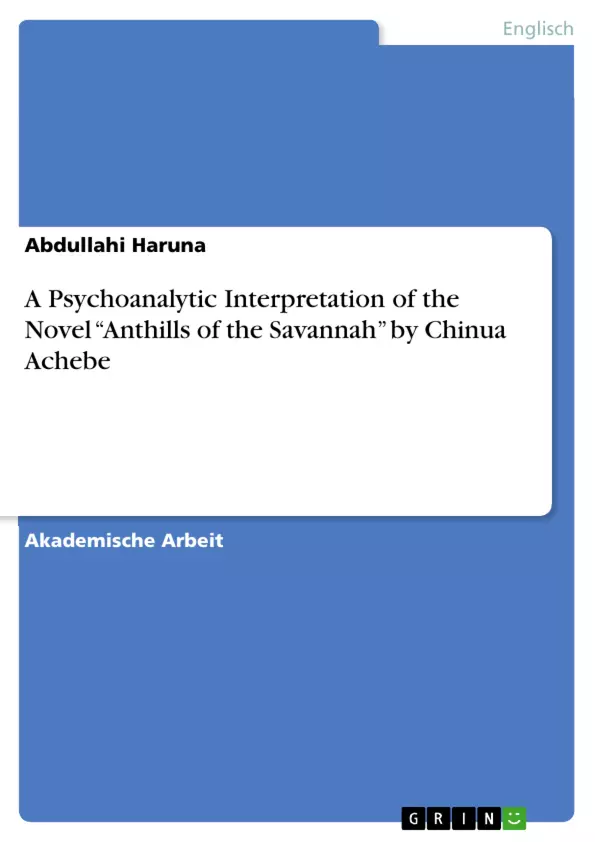This essay examines the application of psychoanalytic critical approach to the interpretation of Achebe's "Anthills of the Savannah". It begins with the explanation of the concept of psychoanalysis highlighting its relevance to literary interpretation and proceeds with an extensive evaluation of the novel using the theory. Findings of the study are provided toward the end of the essay.
Chinua Achebe's "Anthills of the Savannah" (1987), has attracted the attention of scholars and critics. Several critical theories have been applied to the novel to interpret its meaning. The list of scholars who have used several literary theories to examine the novel could be long. However, this paper adopts the psychoanalytic approach on assumption that if this critical method of interpretation is applied to "Anthills of the Savannah", it may unearth the literary treasures that lie hidden in the work. Psychoanalytic critical method if properly put to use would provide us with not only the major preoccupation of the story but also the motivating factor for writing the book.
"Anthills of the Savannah", psychoanalytic theory reveals, takes its inspiration from historical events in Nigeria from 1966 to possibly 1975. But the issues raised in the novel transcend its space and time. The problems criticized in the novel are universal problems which may differ from one country to another in terms of their complexities. The problem of leadership is the central theme of the novel.
Inhaltsverzeichnis
- INTRODUCTION
- WHAT IS PSYCHOANALYSIS?
- APPLYING PSYCHOANALYSIS TO ANTHILLS OF THE SAVANNAH
- CONCLUSION...
Zielsetzung und Themenschwerpunkte
Dieser Essay analysiert die Anwendung der psychoanalytischen Kritik zur Interpretation von Chinua Achebes "Anthills of the Savannah". Dabei wird zunächst das Konzept der Psychoanalyse erläutert, wobei ihre Relevanz für die literarische Interpretation hervorgehoben wird. Anschließend erfolgt eine umfassende Analyse des Romans unter Verwendung der Theorie. Die Ergebnisse der Studie werden am Ende des Essays präsentiert.
- Psychoanalytische Interpretation von "Anthills of the Savannah"
- Relevanz der Psychoanalyse für die Literaturkritik
- Analyse von Motiven und Charakteren im Roman
- Bedeutung von Träumen, Wünschen und Unterdrückung
- Der Einfluss von Freud auf die Interpretation des Romans
Zusammenfassung der Kapitel
INTRODUCTION
Die Einleitung stellt das Thema des Essays vor und erläutert die Relevanz der psychoanalytischen Interpretation für den Roman "Anthills of the Savannah". Sie führt verschiedene kritische Ansätze zur Analyse des Romans ein und betont die Bedeutung der psychoanalytischen Methode zur Erforschung der tieferen Bedeutung des Werks.
WHAT IS PSYCHOANALYSIS?
Dieses Kapitel erklärt das Konzept der Psychoanalyse und ihre Entstehung durch Sigmund Freud. Es beleuchtet die Grundprinzipien der psychoanalytischen Theorie, wie z.B. das Konzept des Unbewussten, die Rolle von Träumen und die Bedeutung von Verdrängung und Sublimierung.
Schlüsselwörter
Psychoanalyse, Literaturkritik, Chinua Achebe, Anthills of the Savannah, Unbewusstes, Traumdeutung, Verdrängung, Sublimierung, Freudianische Theorie, Literaturinterpretation, Charakteranalyse, Motivforschung, literarische Analyse.
- Arbeit zitieren
- Abdullahi Haruna (Autor:in), 1999, A Psychoanalytic Interpretation of the Novel “Anthills of the Savannah” by Chinua Achebe, München, GRIN Verlag, https://www.grin.com/document/470738



